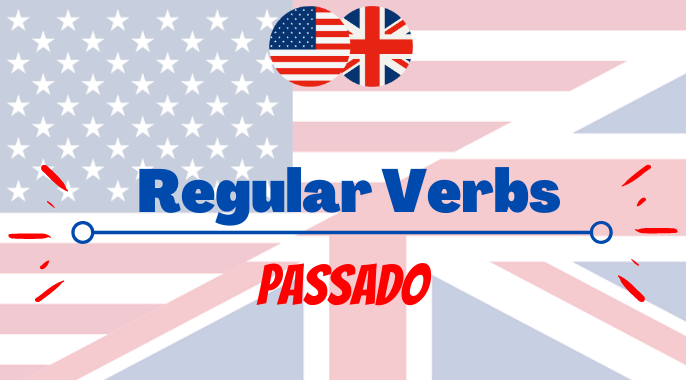
Nesta aula vamos aprofundar o nosso conhecimento sobre verbos, especialmente os regulares. Quando falamos sobre Simple Past ou Present Perfect, devemos conhecer a fundo estes nossos amigos.
Apenas lembrando – os verbos regulares são aqueles que terminam por ED. Uma dica – são três colunas que uma lista possui – a primeira está no infinitivo, a segunda está no passado simples e a última no particípio passado.
Os verbos regulares possuem a mesma forma nas duas últimas colunas. É essencial aprender estes verbos de forma natural, sem memorizá-los, portanto, fique atento as conjugações e variações dos tempos verbais.
VERBO REGULAR NO SIMPLE PAST
Você sabe que o Simple Past é usado para expressar uma ação que terminou em um tempo específico, daí, usamos palavras tais como: yesterday, last week, ago, etc. Nas frases afirmativas o verbo flexiona indo para a segunda coluna, mas se o verbo é regular ele será sempre igual nas duas últimas colunas.
Veja alguns verbos regulares nesta tabela:
| Travel | Traveled | Traveled |
| Work | Worked | Worked |
| Talk | Talked | Talked |
| Study | Studied | Studied |
| Arrive | Arrived | Arrived |
| Play | Played | Played |
| Answer | Answered | Answered |
| Close | Closed | Closed |
| Dance | Danced | Danced |
| Listen | Listened | Listened |
É uma pequena lista – apenas 10 verbos para você ter uma ideia sobre a conjugação. Observe a primeira coluna – o verbo está no infinitivo, e as duas outras com o verbo no passado.
Exemplos de frases afirmativas no Simple Past usando verbos regulares:
Paul traveled to Paris last weekend.
Mary worked at IBM two years ago.
I talked about it yesterday.
Susan studied French in her school.
I arrived at home at noon.
He played volleyball yesterday morning.
Pete answered an e-mail a few moments ago.
She closed the window as soon as she got home.
Mary danced with her father.
I listened to Michael’s songs and I loved them.
Podemos ver que os verbos podem ser usados para qualquer pronome.
I closed / you closed / he closed / she closed / it closed / we closed / they closed
Esta regra vale para qualquer verbo regular, portanto, é essencial conhecer listas de verbos e ler muitos artigos e ouvir músicas e prestar atenção nas letras e observar os verbos nas frases.
Mais exemplos:
What did you do yesterday?
I watched a good movie at home.
Where did you play soccer yesterday?
I played in my school.
What time did you arrive in your house today?
I arrived at home at noon.
Vamos ver agora as frases negativas
- O verbo volta para o infinitivo.
Mary didn’t like that movie.
Peter didn’t work last week.
I didn’t study English today.
We didn’t play soccer last Sunday.
I didn’t talk to him about it today.
O verbo fica no passado apenas nas frases afirmativas – nas negativas e interrogativas o verbo retorna a forma normal.
Mais exemplos:
Did you talk to Peter yesterday?
No, I didn’t talk to him because I was traveling.
Did you close the window?
No, I didn’t close! Sorry!
Did your brother arrive at 2 pm?
No, he didn’t arrive because the traffic was terrible.
Did you play soccer today?
No, I didn’t play because I was studying Math.
Frases interrogativas usando os verbos regulares
Did you talk to your mother about it?
Did she arrive in Europe today?
Did he play the guitar today?
Did you close the door?
Did she travel to London today?
Podemos observar que as frases começam com DID e o verbo está no infinitivo.
Mais exemplos:
What time did she arrive?
She arrived at six pm.
Where did you work in New York?
I worked in a restaurant.
Where did you study in London?
I studied at London University.
VERBOS REGULARES USANDO O PRESENT PERFECT
No Present Perfect, usamos os auxiliares HAVE / HAS + PAST PARTICIPLE – O particípio passado é a terceira coluna da lista – com relação aos regulares, a terceira coluna é igual a segunda, portanto, sem modificações nas frases afirmativas.
Veja estes exemplos:
I have watched a good movie in Miami.
She has played basketball at the university.
I have danced with my wife!
Veja agora abaixo estes exemplos de frases negativas
She has not danced with me.
I have not watched a good movie.
She has not played volleyball.
Frases interrogativas:
Has she arrived at home?
Have you answered my e-mail?
Have you played soccer?
Vamos praticar?
Exercises – Escolha a opção certa:
A) Paul traveled – goed – travels to Chile last weekend.
B) Karen have went – visited – have being South Africa last year.
C) Peter and Paul arrived – arriving – arrives at home at noon.
D) Did you plays – Did you played – Did you play soccer in the morning?
E) He liked – liked not – like no to drink beer but now he prefers wine.
F) Paul did no watch – did not watch – did were watchingTV last night.
G) Karen cooked – cooking – cooks pizza last weekend.
H) Did you arrived – Did you arrive – Did you arriving in Italy yesterday?

 Aprenda sobre o Simple Future ➽ Aprenda sobre o Simple Future ➽ |
 Explicação sobre IN ON e AT ➽ Explicação sobre IN ON e AT ➽ |